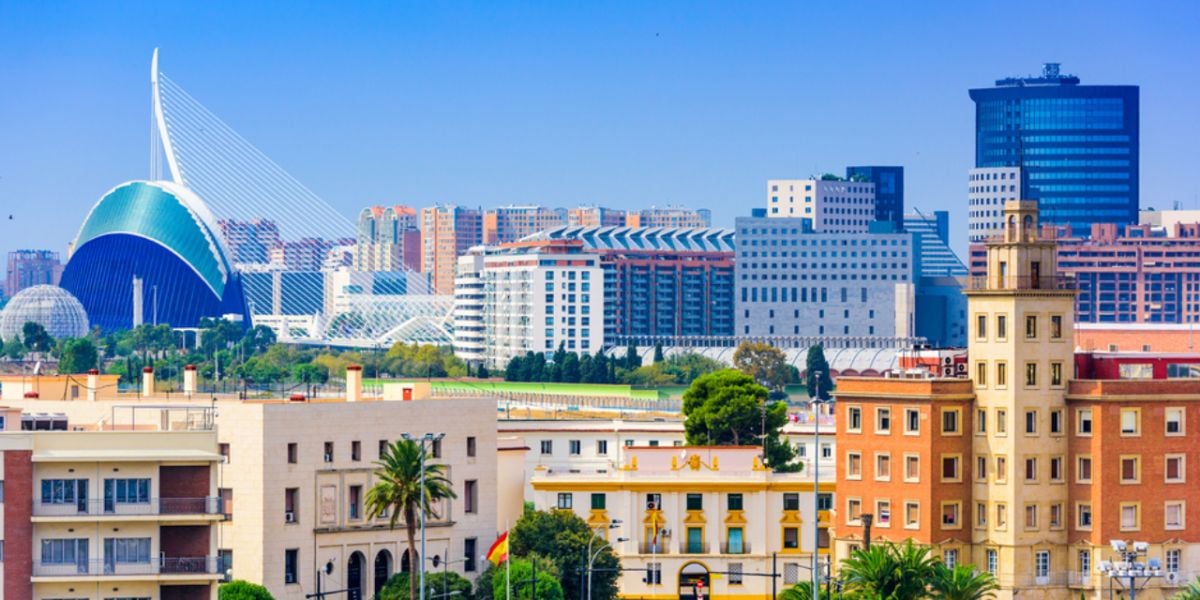
Valencia is the capital of the province of Valencia, a Mediterranean destination of striking architecture, vast market gardens, dreamy urban beaches and lively nightlife on the southeastern coast of Spain. The third-largest city in the country is also one of its oldest and has a population of around 830,000. With so much to offer, it's no surprise that many expats want to live and work here.
If you're going to move to Valencia, you'll obviously need somewhere to stay. Fortunately, a wide variety of excellent accommodations are available in Valencia to cater to different tastes and budgets.
Why live in Valencia?
Here are some of the many reasons that make Valencia a great place to live:
The weather: Valencia doesn't only experience glorious summers; it has great year-round weather with approximately 300 days of sunshine.
The beaches: Most cities can't boast about fantastic beaches on their doorstep. Valencia has superb beaches characterised by their soft, fine sands and clear water.
The open spaces: Besides the sandy expanses, Valencia has many beautiful parks and extensive bike routes.
The people: Valencians are known as friendly, happy and open people. What more could you ask for when looking for friends in your new city?
The history: Valencia started out more than 2,000 years ago, making it one of the oldest cities in Spain. There's history around nearly every corner, especially in the old town with its cobbled streets and centuries-old buildings.
The transport links: The area has an excellent transport infrastructure and is well connected to Europe and the rest of the country. From here, you can travel across the continent on the high-speed AVE train or fly to your destination from Valencia Airport, one of the busiest in the country.
The cultural and leisure options: There is a wide variety of exceptional cultural and leisure options catering to couples, individuals, friends and families alike. Venture into the city center and discover galleries, theatres and concert halls. Among the many popular sites are the Palace of the Arts Reina Sofía, the cathedral and the City of Arts and Sciences. This spectacular cultural and architectural complex is one of the 12 treasures of Spain and hosts an IMAX Cinema, planetarium, Science Museum and the Mestalla Stadium, among other attractions.
The gastronomy: Valencia's cuisine is bursting with mouth-watering flavors, including paella, which hails from Valencia. But there's more to its gastronomic scene than this delicious rice-based dish. Among the millions of flavors to be discovered are Esgarraet (a salad made with roasted red pepper, cod, garlic and olive oil) and calabaza asada (roasted pumpkin).
Valencia's neighborhoods
The city of Valencia is divided into 19 administrative districts, such as Ciutat Vella (old town), El Pla del Real, Patraix and Gamins al Grau. Each of these is further subdivided into neighborhoods, of which there are more than 80. So, there is a lot of choice out there.
As much as we'd love to write about every outstanding quarter in the city, there isn't enough space here, so we'll zero in on some of the most popular and fascinating areas. Among the most popular areas for expats to live in Valencia are El Cabanyal, Ruzafa and Canovas.
El Cabanyal
If you want to live near a beach, then El Cabanyal is probably for you. This seaside neighborhood is located right behind Las Arenas beach and still has an old fishing quarter vibe. However, the area has been changing in recent years as younger generations have opened coworking spaces and trendy bars. Among the neighborhood's standout features is the architecture, a delightful mixture of fisherman's homes, colored buildings, modernist structures and tiled façades.
For many years El Cabanyal has been an up-and-coming neighborhood, and although close to the beach, it is one of Valencia's less touristy areas. That may change as more and more visitors discover its charms. Among the highlights are the independent stores, the Museo Semana Santa Marinera, the Museum of Rice and Cabanyal Market. This smaller version of Valencia's central market is open every day except Sunday and sells local specialties.
The average price per month for rented accommodation in El Cabanyal is around 18.50 euros per square meter.
Ruzafa
This gentrified, popular and fashionable part of the city is just a short walk from the main train station. It was considered a rough part of Valencia with no-go areas. But that is old history. Today it has pedestrianized streets, wide boulevards, bike paths, beautifully renovated buildings, restaurants serving international cuisines, art galleries and experimental art spaces.
One of the main attractions is Ruzafa Market, a 1950s building with a colorful exterior that hosts a fresh food market. As well as stalls brimming with delicious produce, the market is surrounded by many well-priced and inviting cafés. After the sun has gone down, the area attracts a nightlife crowd who come for some of the city's best nightspots.
The average price per month for rented accommodation in Ruzafa is around 20 euros per square metre.
Canovas
With luxurious shops, independent boutiques and upmarket homes, Canovas has a chic and elegant feel. This neighborhood is part of the L'Eixample district and lies close to the center. The old town is about a 15-minute walk away. It has some beautiful traditional architecture and a good selection of bars and restaurants.
The average price per month for rented accommodation in Canovas is around 18.50 euros per square metre.
Ciutat Vella, or old town
Ciutat Vella sits in the heart of the city center. This medieval quarter used to be a walled Roman city and is one of the most beautiful parts of Valencia. Its atmospheric cobbled streets are filled with well-preserved ancient sites and buildings, some of which are found in the Barrio del Carmen.
Among the highlights are the 14th-century Serranos Towers, the 15th-century Silk Exchange and the cathedral. Some people believe this is the home of the Holy Grail.
El Saler
This small village on the outskirts of Valencia boasts stunning natural surroundings, including beaches, rice fields, the biggest freshwater lake in Spain and Albufera Natural Park. This protected area covers an area of approximately 21,000 hectares and is where many rare species of waterbirds go into a form of hibernation during the winter. El Saler is a place for people who love tranquillity, wide-open spaces and want to be close to nature. In your free time, unwind on the beaches, take boat trips through the park and explore your surroundings along hiking and cycling routes.
Benimaclet
This multicultural neighborhood has a young student vibe owing to its proximity to the city's universities. Less expensive than many other neighborhoods, Benimaclet attracts many students because the rents are more affordable. This is one of the most charming parts of the city, a friendly and inviting place known for its small-town feel. Residents have often commented that living here is like being in a village rather than a city. Lying between the city center and the beach, it benefits from good transport links to both destinations. There are also plenty of cycle lanes for those who prefer pedal power to get around.
Mestalla
This family-friendly neighborhood is a quiet place with a slow pace of life. While it doesn't have many spectacular features, it is within a short walking distance of Turia Park and the city center. The beaches are pretty close too. If you're looking for an affordable place to stay that is close to the heart of the city, sea and nature, then Mestalla might be a good option for you. The neighborhood also benefits from good public transport links to the rest of the city.
Good to know:
There are plenty of other delightful neighborhoods in Valencia that might suit your criteria better. For example, Gran Vía, Montolivet and El Botànic, are lovely for families with children and close to Turia Park's green spaces.
How to find accommodation in Valencia
Finding the right property in the right neighborhood is often a time-consuming chore. So, if you can, start the process a few months before your move to the city. This will give you time to browse a wide range of options and to correspond with rental agents. Alternatively, you could wait until you're in the area and drive around to see which neighborhoods and districts suit you.
You can check out accommodation offers in Valencia online and in classified ads in local newspapers. You'll find many studios, apartments and houses available in most, if not all, neighborhoods. Rental prices in Valencia, of course, vary according to the areas, types of properties and amenities.
To give you a rough idea, the rent for a one-bedroom city center apartment is between 900 and 1,400 euros per month, while a similar property outside of the center is between 700 and 1 000 euros. You can expect to pay between 1,470 and 2,800 euros per month for a three-bedroom city center apartment. Away from central districts, a similar property will cost between 900 and 1,850 euros.
Other accommodation options in Valencia include room or flat sharing, which are considerably cheaper.
Top rental tips for expats in Valencia
Here are a few tips to help you find the right property for your needs in Valencia:
- Before coming over to Spain, search for blogs of people living in Valencia to get their take on various neighborhoods.
- Research your daily commute to decide which areas will be the most convenient for you.
- Create accounts on rental websites to receive alerts when the types of properties you like become available.
- Draw up a list of must-haves—for example, a garden, a study, an ensuite bathroom, and an allocated parking space.
- When you are in Valencia, keep an eye out for 'Se Alquila' ('for rent') boards in windows.
- Flats can go fast, and time is of the essence. So, when communicating with prospective landlords/rental agents in Valencia, use the phone or WhatsApp. They're faster and much more effective than emails.
- Do not commit to a property you have never seen. There are stories across Spain, as in other countries, of people renting via an agency from abroad and, when they arrived, discovering the home was nothing like what was described. In some cases, the property didn't even exist.
- Only sign a rental contract after checking it thoroughly to avoid misunderstandings and know your obligations as a tenant. The contract will most likely be in Spanish, so if you're not fluent in the language, pay for a translation. Some rental agencies may have translated versions.
- To avoid issues with your landlord when it's time to hand the keys back, make sure the property is spotless. Dust, clean and vacuum thoroughly.
Good to know:
Rental scams are a fact of life in many countries. To avoid getting scammed in Valencia - 1) never hand over money for something you haven't seen or been inside, 2) make sure there's a rental contract and 3) if you pay cash for a deposit, get a receipt with a picture of the landlord's official ID card.
Rental agreements in Valencia
Like any city, home rental agreements in Valencia are designed to protect both the tenant and the landlord. These contracts are legally binding and spell out the responsibilities and expectations of both parties during the rental period. They outline the lease terms, including the amount of rent, the length of the lease and the consequences of breaking it.
To draw up a rental contract in Spain, the following items are usually included:
- Full name, ID number and contact details of the landlord and tenant;
- Information about the rental property, such as the address, number of rooms, size of the property and any other relevant information;
- The rental amount and payment terms;
- Security deposit and other charges like utility bills;
- The start and end date of the lease agreement, along with the notice period required to terminate the contract early;
- Renewal options;
- Date and signature of both parties.
Good to know:
The typical length of long-term rental contracts in Spain is five years.
How to find cheap rentals in Valencia
There are plenty of ways to find a great place to stay in Valencia without breaking the bank. To help you, we've compiled a list of handy tips.
- Start your search early to get the best deals and options;
- Consider staying outside the city center as prices tend to be lower;
- Use search filters to narrow down your options by price, location, amenities, and guest ratings;
- Check the availability of special offers and discounts for longer stays;
- Contact landlords directly to negotiate prices and ask for additional discounts;
- Consider sharing a room or apartment to split costs;
- Consult local travel forums and blogs for insider recommendations on budget accommodations.
The housing market in Valencia
If you're considering purchasing a property in Valencia, the average purchase price per square meter for an apartment in the city center is 3,449.55 euros. The average price outside of the center is 2,403.01 euros
Useful links:
We do our best to provide accurate and up to date information. However, if you have noticed any inaccuracies in this article, please let us know in the comments section below.








